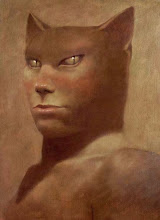
The Leopard has been thinking lately about that wonderful art form that I've devoted so much of my life to: Jazz.
Not only as a once near fanatical collector and lover of the music, but also it's been a great inspiration to me in almost all facets of my life. For years, I worked for a large institution devoted to jazz; I've written about jazz as a reviewer, and much of my visual art has been connected to the music.
The obsession started as just being someone who simply enjoyed the music. A friend of mine who was a bit more sophisticated than me at the time discovered it first, and we would listen to Miles Davis and Charles Mingus records in his house, taking it all in, trying to figure out what the hell was going on. In addition to the music itself, I enjoyed the visual presentation. The wonderful Blue Note album covers, for example, with their gorgeous introspective photos of the artists which suggested the very epitome of cool. It was one of my greatest inspirations and what probably eventually led me to become a designer.
But the thing that I think I was most attracted to was the idea of creating art with freedom of expression that also translated into a profession--something that people paid to see that was almost as challenging to listen to as to create. I love Jazziz magazine's description, "Art for your ears".
The basis of jazz , improvisation, always held interest to me. I remember digging the Kind of Blue album for the first time, hearing each soloist play off ideas from the melody line of the tune All Blues and thinking about the infinite possibilities each musician could extend their musical imagination within the framework of the tune.
It did more than open my mind up musically, but also as an artist and a creative person. You can build up a traditional framework and playing within the confine of the song, or you can even go further, like latter day John Coltrane or Ornette Coleman or Albert Ayler, and have no boundaries at all; you could veer off into the further reaches of space, without a net. Of course, this can make things challenging for the listener, but those who stick around can be rewarded. That's where jazz I think gets the reputation as "challenging" or "difficult" music. I personally think it's more about listening a little harder and opening yourself up a little.
With the decline compact discs, I fear that in the digital internet landscape jazz may evaporate and the many young up-and-comers won't have the backing of record companies to promote them (honestly though, the truth is many of the major companies had dropped their jazz divisions before the decline of the CD). People will have to seek it out, even for the great masters like Duke Ellington, Louis Armstrong and Charlie Parker. It will take some doing with the massive amount of information floating around, to keep the music going.




















3 comments:
What wonderful illustrations and interesting postings!
Thanks for the encouragement. Keep reading!
You're very talented. Keep on!
Post a Comment